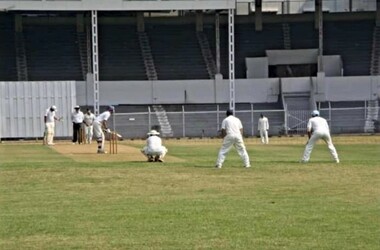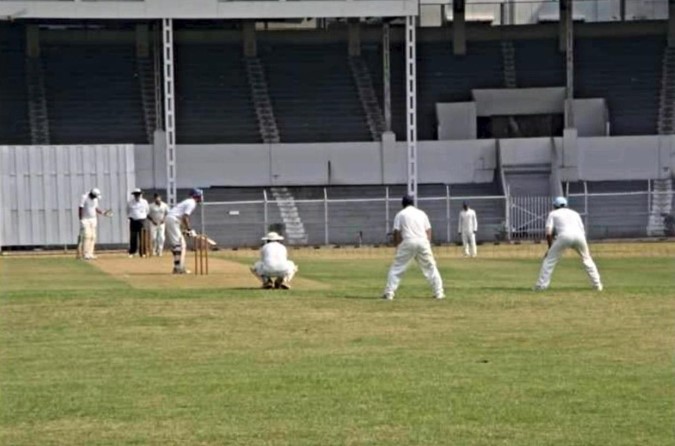Known, Unknown and the In-Betweens


Last week, I was browsing through my phone when I came across this decade-old picture. It transported me back to my days of opening the batting for my cricket team. We played at a good competitive level, practice was regular and thorough enough to prepare us to be able to compete consistently at that level.
While the first thought was nostalgia, what hit me most though was that indescribable feeling while walking out to face the first ball of a match.
There always was the element of the unknown as we generally played a different team each time. The bowlers were unknown: are they quick? Do they swing the ball? If they do, which way are the guys likely to swing it? Will they try to bamboozle us by opening with a innocent looking spinner? And then are their spinners any good to turn the ball consistently? How would the pitch actually play? Is the pitch going to cause high or low bounce? Are the umpires good enough to judge me? Dude, where's my bat? (Okay that last one has a story of its own, but that’s for another day).
The butterflies-in-my-stomach feeling had become a normal thing while taking stance before the first ball, as much as hitting each pad with my bat alternately a few times had become a routine before facing the bowler. All the uncertainties would pay visit to the mind. In that space, one has to find a sense of groundedness, of balance and of calm to be able to effectively face the first ball and the ones to follow. And as I look back, I see how a consistent process helped me do that.
No one likes to get out on the first ball of a cricket match- and that fact would play on my mind even more.
Fortunately, I was able to get through the first few overs of uncertainty and unpredictability rather consistently. And my records showed that if I was still in the middle after the first 8 or 9 overs, more often than not I would go on to put up a good score and play a reasonably long innings.
Upon more contemplation, a thought crossed my mind- A majority of us humans are not too fond of the unknown. There is a sense of fear associated with it. We always try and figure to see if we can find out what the near future holds. Or what the outcome of our next action would be. We want to know what’s going to happen next. We like guarantees. We find comfort in certainty. But our wanting anything makes no difference to what is real - not everything can be known.
In our world of financial markets again, this aspect is one to pay attention to, for any investor. It is not uncommon to hear the words 'risk of the unknown'. And sometimes, it works the other way too – ‘gains from the unknown’. Sometimes, the market simply decides to ignore what’s showing signs out there, until the time it is literally in your face, causing an inevitable sharp reaction.
What I'm trying to get at is that our existence can be analyzed in some ways and yes one can take a view based on predictions, but life will always remain full of many uncertainties. So how do we, whether it be in the investment management business or any another aspect of life, be better placed to be able to handle, respond or better absorb the outcome of these unknown experiences when they arise?
Going back to my cricket days, I remember how consistently I used to practice. Early morning and late evenings on weekends, after work under lights in the night on weekdays. Sometimes play a morning 20 over match and then go for an evening net session. I used to face the bowling machine twice a week to focus on my weak areas by setting the ball to be bowled in that weak area for the entire length of time I was there.
I had a process a day before the game where I played a scenario in my mind and acted according to how I thought I should on the crease. I would recall my previous errors so that I do not repeat them in the game the next day. And on the day of the game, I would try and remain meditative and recall a few instances when I played out a very high-level bowling side to give myself the reassurance that I'm good enough to face whoever comes my way.
Last thing I would do before the toss, I would go close to the pitch, have a good look at it, touch it with my hands to really feel it and get to know it slightly better. This habitual acquaintance with the pitch held me in good stead. Well, I also had a pretty elaborate superstitious ritual before each ball was bowled, much like many sportspeople! (Again, we’ll leave that for another day or maybe a conversation over coffee some time :) )
Thinking about all this makes me realize that having a strong foundation, through a rigorous process, was the key to my being able to handle the discomfort of facing the unknown. And be able to adapt and appropriately tackle the blowers or pitch conditions on the given day. This same principle could apply across many aspects of our lives.
It is important to add here another realisation – that mere habitual practice just for the sake of practicing does not always produce that desired outcome. It takes a sense of devotion, love or passion behind that consistent practice or process mixed with more than a dash of faith and patience, to be able to derive the benefits from it.
Fear stops us from experiencing life, achieving goals that are waiting to be met just on the other side of facing that fear. What can help us to move forward with more faith and conviction to cross that line is a consistent and well-rounded process/practice. Sure, “darr ke aage jeet hai”, but more than that I feel “Preparation and confidence ke aage jeet hai.”
Some of us reading this may have some form or the other of a process that could make us better equipped to more appropriately handle or respond to the ups and downs of every day. A mindfulness practice in the morning or evening for some, others may rely on a simple prayer or chant. Some may practice sitting in complete meditation, for some others it could be reading a book or playing an instrument, while for some it could be practicing yoga asanas.
When any of these are practised with consistency, the effect on one’s way of being and its results can be noticed quite evidently over a period of time. If nothing else, you tend to become a less volatile person for sure! You may notice your road rage has calmed down considerably. Your sense of compassion may rise. You may become more understanding of people and situations and be able to adapt and respond better. Basically, unpredictable events outside of your own control will have less of an effect on your state of being.
At DSP, we have been executing upon and talking a lot about frameworks, processes, investment styles and risk and quantitative measures used in our fund management. And while there is data to show how these have worked in the funds' favor during times of volatility and through different market cycles, the very consistency of following these processes brings a sense of reassurance on how one's money is going to be managed.
Yes, the market will throw bouncers and googlies our way, or an event will throw up sudden overcast conditions where the ball (the market) may start swinging both ways. But we know that we have the quality in our fund management processes and a solid defense through risk and quantitative measures that will help us tide through those times. We have our own “Commandments’’ that give us the confidence to handle such scenarios. We trust that this would help some investors to invest with more clarity and conviction and stay put through the fear of market uncertainties and volatility, for the long haul.
Personally, (call me biased if you have to, since I work at DSP), I find comfort whenever I'm evaluating DSP funds. Knowing the individual fund manager styles with more clarity, the frameworks they work within, makes me feel quite confident. It also makes it easier to decide on which fund at any given time I should allocate to - and how best to create the most appropriate fund mix that would make my investment journey a smoother and longer one. Maybe this is something like The Wall’s long test innings – a solid defense combined with some thoughtful flicks and flourishing cover drives. That kind of innings could sound boring to some, but in investing, boring often gets the job done.
Let me close this post with a quote borrowed from the ‘American Poet’ himself:
“There are things known and things unknown and in between are the doors.” - Jim Morrison (or was it Aldous Huxley?)
About the author
Rohan Desai, based in Mumbai, is AVP- Institutional Sales & Family Offices at DSP Asset Managers. He loves spending time in nature, tracking big cats in India’s tiger reserves and observing with great curiosity, even the smallest insects and plants. He likes to express his die-hard love for nature by sharing his experiences, influencing friends and acquaintances to reclaim that innate connection with our planet. Having also played a good level of competitive cricket, he feels that these two hobbies have been his best teachers in life. He often says, especially when on nature trails - “Pay attention to the smaller things, and eventually you’ll see the bigger picture”.Disclaimer
This note is for information purposes only. In this material DSPAsset Managers Pvt Ltd (the AMC) has used information that is publicly available and is believed to be from reliable sources. While utmost care has been exercised, the author or the AMC does not warrant the completeness or accuracy of the information and disclaims all liabilities, losses and damages arising out of the use of this information. Readers, before acting on any information herein should make their own investigation & seek appropriate professional advice. Any sector(s)/ stock(s)/ issuer(s) mentioned do not constitute any recommendation and the AMC may or may not have any future position in these. All opinions/ figures/ charts/ graphs are as on date of publishing (or as at mentioned date) and are subject to change without notice. Any logos used may be trademarks™ or registered® trademarks of their respective holders, our usage does not imply any affiliation with or endorsement by them.
Past performance may or may not be sustained in the future and should not be used as a basis for comparison with other investments.
Mutual fund investments are subject to market risks, read all scheme related documents carefully.







Leave a comment